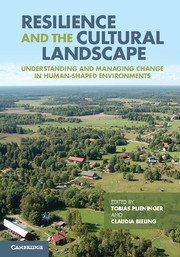 Resilience and the Cultural Landscape
Resilience and the Cultural Landscape Book contents
- Frontmatter
- Contents
- List of contributors
- Preface
- Part I Conceptualising landscapes as social–ecological systems
- Part II Analysing landscape resilience
- Part III Managing landscapes for resilience
- 12 Collective efforts to manage cultural landscapes for resilience
- 13 Response strategy assessment: a tool for evaluating resilience for the management of social–ecological systems
- 14 Ecosystem services and social–ecological resilience in transhumance cultural landscapes: learning from the past, looking for a future
- 15 The role of homegardens in strengthening social–ecological resilience: case studies from Cuba and Austria
- 16 Promises and pitfalls of adaptive management in resilience thinking: the lens of political ecology
- Part IV Perspectives for resilient landscapes
- Index
- References
16 - Promises and pitfalls of adaptive management in resilience thinking: the lens of political ecology
Published online by Cambridge University Press: 05 November 2012
- Frontmatter
- Contents
- List of contributors
- Preface
- Part I Conceptualising landscapes as social–ecological systems
- Part II Analysing landscape resilience
- Part III Managing landscapes for resilience
- 12 Collective efforts to manage cultural landscapes for resilience
- 13 Response strategy assessment: a tool for evaluating resilience for the management of social–ecological systems
- 14 Ecosystem services and social–ecological resilience in transhumance cultural landscapes: learning from the past, looking for a future
- 15 The role of homegardens in strengthening social–ecological resilience: case studies from Cuba and Austria
- 16 Promises and pitfalls of adaptive management in resilience thinking: the lens of political ecology
- Part IV Perspectives for resilient landscapes
- Index
- References
Summary
Introduction
Resilience thinking analyses the structure and function of a social–ecological system to inform adaptive management on how to avoid a regime shift into a new and potentially undesirable state (Walker et al., 2002). The focus of resilience approaches on how much shock a coupled social–ecological system can absorb and still remain within a desirable or undesirable state begs many questions about what that state is, why it is so desirable, and for whom. A social–ecological system is considered to be in a desirable state based on its ability to provide ecosystem services for societal well-being and development. Resilience studies to date have not adequately considered whose needs are being met from these goods and services and the politics of their distribution and management. These questions are relevant for understanding why the potential for adaptive management is often not realised. We use a combined social–ecological resilience and political ecology approach to make these connections. Our engagement with the analytical approach of social–ecological resilience provides a more nuanced understanding of the ecological structure and function of social–ecological systems. Political ecological insights contribute to an understanding of the political economy of natural resource use and management. Our goal in this chapter is to illuminate how combined social–ecological relations structure social–ecological systems can produce unequal outcomes that are often highly contested from the perspectives of competing resource users whose vision of a desirable state differs from one another.
Similar to Widgren (Chapter 6), we seek to invigorate political ecology by engaging with the ecological insights provided by resilience thinking. This is a major challenge in the field of political ecology, as ecology often takes a back stage to social–political dynamics (Turner, 2009). Political ecology is an interdisciplinary social scientific approach to the study of human–environmental relationships. Political ecologists examine how social and ecological processes interact and change over time with respect to natural resource management and environmental quality issues. The aim of integrating political ecological insights into resilience thinking is to address what we argue are the seemingly apolitical perspectives of resilience thinking (Kirchhoff et al., Chapter 3). We also problematise the current lack of attention paid to power relations and asymmetries in conceptualisations and prescriptions of adaptive management solutions in resilience thinking.
- Type
- Chapter
- Information
- Resilience and the Cultural LandscapeUnderstanding and Managing Change in Human-Shaped Environments, pp. 283 - 300Publisher: Cambridge University PressPrint publication year: 2012
References
- 29
- Cited by


